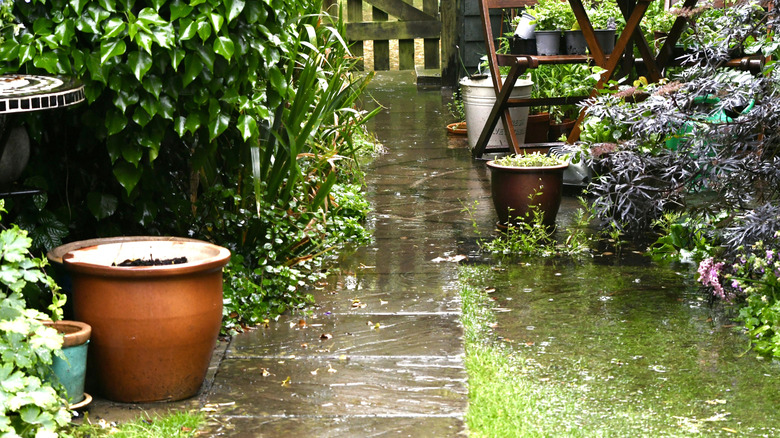Neighbor's Flooding Water Ruining Your Yard? Here's Exactly What To Do About It
Having amicable and supportive neighbors is akin to winning a jackpot. You get to share your collective pains, host delightful barbeques together, and know you have someone who'll have your back in HOA meetings. However, what happens when one of your "amazing" (or annoying) neighbors makes certain changes to their property and their new water drainage system starts flooding your yard? Should you pay for remedial solutions, like basins or French drains, out of your pocket? Or, can you hold your neighbors responsible for their actions? To understand more about this and find out how to respond when your neighbor's water floods your yard, House Digest spoke exclusively with Kenneth "Tray" Gober — a Texas-based attorney and managing partner of Lee, Gober & Reyna.
"Typically, the neighbor may be responsible if their actions — such as altering landscaping, redirecting runoff, or discharging water via sump pump — unreasonably increase water flow onto your property," Gober explained. "Many states follow a 'reasonable use' rule, meaning landowners can modify their property, but if it causes unreasonable harm to another, they can be held liable." In other words, if the pooling water can cause structural damage to your property, you can take legal action against your neighbors. Similarly, if they did it with malignant intentions or didn't take the right measures while making changes to their landscape, you have the freedom to lodge a complaint. But before you burn all bridges, there are a few ways to resolve the situation.
What to do when your neighbor's flooding water ruins your yard
Speaking exclusively with House Digest, Gober recommended that you start with collecting some hard proof. This means capturing photos and videos showcasing how the water draining from your neighbor's house is flooding your yard. Once you have undeniable evidence, approach the people next door. Wondering how you could possibly get along with your difficult neighbors? He said, "Politely talk to your neighbor. They may not realize the problem, and a cooperative solution is often easiest." Drawing from his personal experience, he iterates, "This happened with my neighbors and we split the cost of adding a 4-inch drain pipe to take water out to the street. The problem ended there."
In case that doesn't work, send them a formal notice. "A written letter explaining the damage and asking for corrective action is a good next step," Gober said. "I suggest sending it both first class and certified mail so you will have proof you sent the letter." However, if that doesn't work, you'll have to get an attorney involved to take legal action against your problematic neighbors. They "can help you explore options, like a demand letter, mediation, or a lawsuit for nuisance, negligence, or trespass." Unfortunately, you can't sit idly during the procedures or the puddles in your yard will make it easier for mold and mildew to take root. Look into useful drainage solutions to prevent your yard from overflowing. "You might need to take temporary action to protect your yard, like installing barriers or regrading your own landscaping, even while the dispute is addressed. Then you may be able to recover the cost of your mitigation efforts," suggested Gober.
Are there local ordinances that address water drainage and runoff?
In case the legal procedures seem too drawn out or you're not willing to spend money on temporary mitigation solutions, check your local ordinances. Outlining the process, Gober mentioned in his exclusive chat with House Digest, "Many cities and counties have ordinances prohibiting property owners from altering natural drainage in a way that harms neighbors." So, you can take your issues to the local authorities and let them deal with them. But how do you check the rules and see if the people next door have actually broken the law? "Your city or county website, typically under 'code enforcement' will list these rules," he said. "Checking your local ordinances is critical because it can give you leverage and a clearer path for complaints."
Going this route can be beneficial because "local governments sometimes issue citations if drainage issues violate city codes." Certain environment protection agencies might be of help, too. You could even bring up this problem to your HOA's attention. Elaborating the reason behind this, Gober said, "HOA covenants often contain additional restrictions beyond public law." Just ensure you know how to effectively file a complaint to make sure your HOA listens to your inconveniences and does something about your ruined yard.


